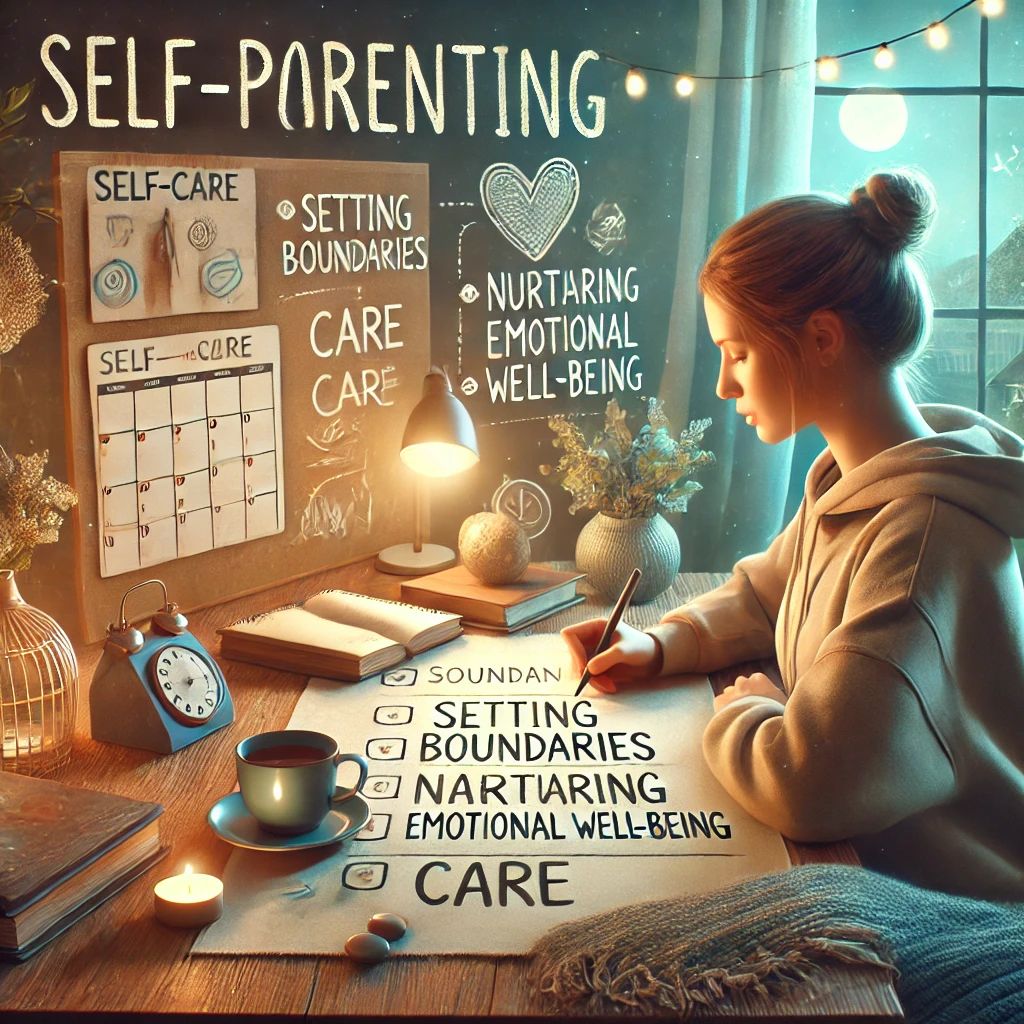
What Does It Mean to Parent Yourself?
Parenting yourself means taking responsibility for your own physical, emotional, and mental well-being by providing the care, structure, and support you might expect from a parent. It’s about learning to meet your needs, establish healthy boundaries, and offer yourself kindness and guidance. By learning to parent yourself, you can create a healthier, more fulfilling life, even in the absence of external support.
Why Self-Parenting is Important
Self-parenting is essential for personal growth and emotional resilience. When you take the role of your own caregiver, you cultivate self-reliance, emotional intelligence, and self-compassion. This allows you to make choices that align with your values, manage stress more effectively, and nurture your well-being without depending on others.
How to Practice Self-Parenting
Here are key ways to effectively parent yourself, offering guidance, structure, and self-care to support your well-being:
1. Set Boundaries and Protect Your Energy
One of the key aspects of parenting is creating a safe and structured environment. To parent yourself, you need to set healthy boundaries to protect your time, energy, and emotional well-being:
Learn to say no: Saying no is a form of self-protection. Don’t feel guilty about turning down requests or commitments that overwhelm or drain you.Prioritize your needs: Just as a parent prioritizes a child’s well-being, you should prioritize your own needs. Recognize when you need rest, space, or time for yourself, and honor those needs.Limit toxic influences: Create a healthy environment by reducing exposure to toxic people, negative self-talk, or unhealthy behaviors. Set boundaries to protect your peace.2. Practice Self-Compassion and Forgiveness
Parenting yourself involves showing compassion, patience, and forgiveness when you make mistakes or face setbacks:
Talk kindly to yourself: Replace negative self-talk with encouraging words. Be your own biggest supporter by using affirmations and positive self-talk, especially when you’re feeling down.Forgive yourself: Just as a parent forgives a child for mistakes, forgive yourself when you fall short or make a wrong decision. Focus on learning from the experience rather than dwelling on guilt.Be patient with yourself: Personal growth takes time, so allow yourself to progress at your own pace. Treat yourself with the same patience you would offer a loved one.3. Create Healthy Routines
Establishing consistent routines helps create stability and structure in your life, much like a parent would do for a child:
Set a sleep schedule: Prioritize adequate rest by setting a consistent bedtime and wake-up time. A regular sleep schedule improves your mood, energy, and mental clarity.Plan nutritious meals: Nourish your body with balanced, healthy meals. Cooking at home or planning meals in advance can help ensure you get the nutrients you need.Incorporate movement: Regular physical activity is essential for overall well-being. Find an exercise routine that you enjoy, whether it’s walking, yoga, or weightlifting, and make it part of your daily life.4. Support Your Emotional Well-Being
Caring for your emotional health is a crucial part of self-parenting. Provide yourself with emotional support, just as a loving parent would:
Acknowledge your feelings: Pay attention to your emotions and give yourself permission to feel them. Whether you’re experiencing joy, sadness, frustration, or anger, all emotions are valid and deserve to be acknowledged.Seek outlets for emotional expression: Find healthy ways to express your emotions, such as journaling, talking to a trusted friend, or engaging in creative activities like art or music.Take time for self-reflection: Regularly reflect on your emotional state and how different situations impact you. Understanding your emotional triggers helps you respond more calmly and constructively.5. Be Your Own Advocate
Part of parenting yourself involves standing up for your own well-being and speaking up for your needs and desires:
Assert your needs: Advocate for yourself by communicating your needs clearly, whether at work, in relationships, or in social settings. Don’t wait for others to guess what you need—express it confidently.Practice self-respect: Respect your own values, desires, and boundaries. Don’t compromise your self-worth to please others or avoid conflict. Standing firm in your principles is an essential part of self-parenting.Take responsibility: Being your own parent means taking responsibility for your decisions, actions, and well-being. Own your choices and learn from mistakes to foster personal growth.6. Nurture Your Inner Child
Parenting yourself also means nurturing your inner child—the part of you that seeks joy, curiosity, and playfulness:
Engage in activities that bring joy: Rediscover hobbies and activities that make you happy. Whether it’s painting, dancing, or spending time in nature, make room for fun and creativity in your life.Give yourself permission to play: Allow yourself to be playful and carefree, just as a child would. Playful activities reduce stress, boost creativity, and improve overall well-being.Practice self-care rituals: Nurture yourself with regular self-care routines, such as relaxing baths, skincare, or time spent doing things that make you feel cared for and rejuvenated.Conclusion: Embrace the Role of Parenting Yourself
Learning to parent yourself is an empowering practice that allows you to nurture your well-being, set boundaries, and foster emotional resilience. By creating structure, practicing self-compassion, and advocating for your needs, you take control of your happiness and personal growth. Remember that parenting yourself is a lifelong journey that requires patience, kindness, and self-awareness. As you develop these skills, you’ll cultivate a healthier, more fulfilling relationship with yourself.
The article was prepared by Lyle Gardner.



